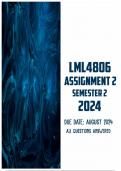, PLEASE USE THIS DOCUMENT AS A GUIDE TO ANSWER YOUR ASSIGNMENT
Please note that the author of this document will not responsibility for any plagiarizing you
commit.
Question 1
1. Barbara is a business rescue practitioner of Thirsty Elephants (Pty) Ltd, a company that is
under business rescue. She convenes a meeting of the creditors of Thirsty Elephants (Pty) Ltd to
discuss and vote on the business rescue plan. The business rescue plan contains ample provisions
that protect the interests of the secured creditors of Thirsty Elephants (Pty) Ltd. Winelands
Packers (Pty) Ltd, a secured creditor of Thirsty Elephants (Pty) Ltd holding 27% of the
creditors’ voting interests that are voted at the meeting, votes against the adoption of the
business rescue plan. All the other secured and unsecured creditors in attendance at the meeting
vote for the adoption of the business rescue plan as the plan presents certain advantages to them.
Barbara is concerned that Winelands Packers (Pty) Ltd’s vote against the adoption of the
business rescue plan is detrimental to the successful rescue of Thirsty Elephants (Pty) Ltd, the
interests of its employees and the interests of the other affected creditors. With reference to the
Companies Act 71 of 2008 and the relevant case law, advise Barbara on whether she may
successfully apply to a court to set aside the vote of Winelands Packers (Pty) Ltd. In your advice,
you should discuss the grounds on which such an application may be made, the factors that the
court should take into account when considering such an application and the effect of a court
setting aside Winelands Packers (Pty) Ltd’s vote.
Barbara, as the business rescue practitioner for Thirsty Elephants (Pty) Ltd, can seek to have the vote
of Winelands Packers (Pty) Ltd set aside by the court. The Companies Act 71 of 2008 provides a
mechanism for this under certain conditions, particularly when a vote against a business rescue plan
is detrimental to the successful rescue of the company and other stakeholders' interests.
Grounds for Setting Aside the Vote
Under Section 153 of the Companies Act 71 of 2008, a business rescue practitioner can apply to a
court to set aside a vote against the adoption of a business rescue plan if the vote was inappropriate.
Specifically, a court may set aside a vote if it is satisfied that it is reasonable and just to do so,
considering:
The Interests Represented by Those Voting Against the Plan: The court will assess the
interests and motivations of the creditor voting against the plan. If the opposing vote is found to
be unreasonable or not in good faith, the court may be inclined to set it aside. For instance, in
the case of Collard v Jatara Connect (Pty) Ltd, the court ruled that major creditors are required
to exercise their vote in good faith. This implies that votes cast with ulterior motives, such as
sabotaging the rescue plan for competitive reasons, could be considered inappropriate.
Provisions Made in the Proposed Rescue Plan: The court will consider whether the business
rescue plan adequately protects the interests of the dissenting creditor. If the plan makes fair
and reasonable provisions for the secured creditor, such as ensuring their claims are met or
providing a better return than liquidation, the court may view the vote against the plan as
unjustified.





